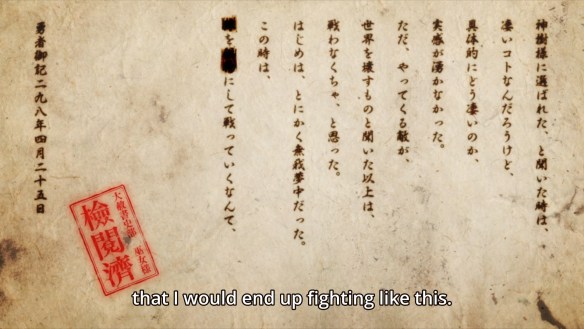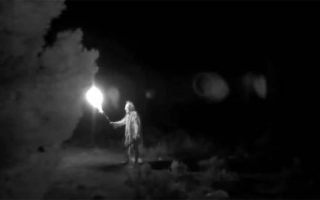Hello folks, and welcome back to Wrong Every Time. You all ready for some suffering? I had figured saving the entirety of humanity at enormous physical and emotional cost would have earned the girls of Yuki Yuna a reprieve, but apparently the beatings must continue. With more than a little trepidation, today we journey onward into Yuki Yuna is a Hero’s Washio Sumi Chapter!
If anything, we’re now actually worse off than we were before, as this is a story with a known and terrible ending: the tale of Togo’s first run as a hero, wherein she was adopted into a family blessed by the Divine Tree in order to be exploited as a sacrifice to their god. We learned enough from the first season to grasp the broad beats of this narrative, so what I’m most intrigued about is gaining more context regarding the Divine Tree itself, its nature and how it expresses its will.
The idea that humans are simply pawns in wars between overwhelming eldritch identities, and that we’ve furthermore chosen to ally ourselves with one such implacable being in order to cling to survival, is a fascinating conceit for a magical girl drama. Additionally, human resilience in spite of a profoundly broken world is one of my favorite dramatic juxtapositions, embodied even in that “if anyone says there’s no reason to hope, I’ll prove them wrong every single time” line that gave my site its name. Let’s see how our heroes rally against the dying of the light as we return to Yuki Yuna!
Episode 1
We open on a monologue framed like a letter to a past self, describing our heroines’ determination upon being chosen by the Divine Tree, and their surprise at how things would ultimately turn out. A tone of fatalistic inevitability is thus set right from the start, even for viewers who missed the context of the previous season
Cool blue tones as we check in on Togo washing herself at the sprawling family estate she was adopted into. A clear distinction from the first season in terms of mood and color palette; we’re following Togo rather than Yuna, and thus the original’s warm hues and energetic tone have been replaced by chillier colors and a more meditative pacing reflective of her own personality
A focus on ritual and propriety right from the start, extending from these religious ceremonies to Togo’s staid offering of breakfast to her adopted parents. Through the similar colors and designs of their uniforms, Togo is immediately associated with the servants, rather than her alleged parents
Sprawling environmental shots and a gentle guitar melody offer a sense of freedom and security as we are introduced to her town
“Peaceful Morning, Rich Country, Strong Army,” reads a slogan along their schoolhouse walls, emphasizing this society’s subservience to the Divine Tree’s philosophy
Togo’s seat-neighbor Nogi is asleep at her desk, and wakes up with a flurry of apology. Presumably she’ll be joining the team
Togo’s clearly a bit more hung up on propriety at this age, and stares disapprovingly at Nogi
Then we get our third presumed lead, Gin Minowa, who rushes into the classroom right after the teacher. She’ll be the energetic leader-type, presumably
“Why were you late today?” “There’s a lot that goes on when you’re in 6th grade.” This ambiguous non-answer definitely reminds me of Fu’s odd turns of phrase, her tendency to aspire to a sense of maturity and mystery
Oh wow, love this setpiece of thousands of bells and talismans hanging from their suspension bridge, set to chime in unison when the moment of conflict approaches
With only half a season of running time, we’re clearly not lingering on preamble this time, and our three heroines are swiftly flung into the Divine Tree’s spirit realm. An interesting shift; Yuki Yuna leaned heavily on the contrast between the lives its characters “should” be living versus the thankless roles they were assigned, so I’ll be interested in seeing how this shorter season builds up a sense of tension, particularly with the conclusion already set in stone
“It’s just like they taught us.” Interesting how this group of heroines is actually fully prepared, having been explicitly taught how their missions will proceed. I wonder if such schools still exist alongside groups like Yuna’s, or if the Divine Tree ended up deciding that less information is actually more likely to successfully convince warriors to protect it
Gin is very excited to be chosen as a hero
Our first Vertex appears, a suitably otherworldly jellyfish-shaped creation that appears to emit bubbles from its core
“Souls rise up to call down the power of the gods.” The girls actually have a specific ritual mantra they have memorized for summoning their powers. Ooh, I love this – as we learned in Yuki Yuna, basically any chosen ritual can suffice to initiate this transformation, you just need to believe in it. However, at this point and for this group, the Divine Tree has apparently decided that embracing these ornate ritual signifiers will likely convince its “heroes” all the more of the sanctity and necessity of their task. The pomp and ceremony’s only purpose is to convince these girls they are fighting in a holy war
Togo is still framed as a ranged fighter with a bow, while Gin is unsurprisingly associated with fiery red hues, and employs dual swords reflective of her aggressive personality
Oh my god, what even is Nogi’s transformation. Her suiting up is accompanied by an array of super-deformed dancing kittens, it’s basically a meme from the start
She wields a spear that seems to shoot emojis, of course
“We haven’t done a joint training yet.” “The enemy appeared sooner than we expected.” So either the Divine Tree elected to abandon this overt hero training program because it decided uninformed heroes were more efficient/effective, or else all the students of such schools have already been consumed by the time we reach the first season. Either way, not a great takeaway
Togo urges caution, but the other two are eager to fight
The Vertexes continue to be a smart, efficient design choice. Their pure geometric forms prevent the audience from assigning them any sort of coherent human intent, while also making them pretty convenient to animate
Gin and Nogi’s haste quickly earns them some blows from the Vertex
Hah, love the detail of Togo’s arrows “charging up” through a ritual circle of petals that light up sequentially like a loading bar
Her fully loaded arrow is deflected by a handful of bubbles. The girls aren’t doing great!
Nice eerie visual effect as the tree burns while the Vertex floats overhead
Gin almost drowns when one of the water bubbles strikes her head, but she escapes by… drinking her way out of the situation. Absolute horror to farce in five seconds flat
Lovely shot as the Vertex continues its march, with glimmering lights rising off the Divine Tree’s roots as they burn beneath it. A shot that embodies the cruel calculus of the Divine Tree, that we are all most beautiful when we are being cut down in our prime
The girls elect to try a new idea: “strategy”
Nogi’s spear-shield protects them as they march closer to the target. Togo is pretty much always relegated to a support role; her weapons cannot pierce the enemy directly, so she must guide her teammates towards effectively employing their more powerful strikes. A natural way to balance the team dynamic; if Togo weren’t forced to rely on her teammates, her competency and level-headedness would kinda overwhelm the conflict
Ooh, some nice cuts of traditional animation as Gin strikes at the target
Blue lights rise from the earth like lanterns as the Vertex is defeated, followed by flower petals falling from the sky. I appreciate how they’re leaning more into the strange rituals and internal rules of this alternate world this season
Rather than returning to their school, the girls reemerge at a shrine beneath the barrier bridge, emphasizing the clear religious framing of their mission while also calling back to the first season, when Togo and Yuna first encountered their predecessors
Diligent as ever, Togo’s reflections on the battle emphasize how close it was, how easily they could have lost
Togo thus swiftly googles “how to make friends,” determined to make this teamwork thing happen
Having learned about friendship from the internet, she bravely invites the other two to a celebratory gelato at the mall
Oh my god, she prepared a script. Togo is so much
“I’m not good at relying on other people.” Considering she’s lived her entire life so far as an instrument of the Divine Tree, that’s not surprising. There is no warmth in her home life; she is wholly dedicated to her role, but that means she is brittle in a similar way to Karen, lacking the support structure to bend under pressure rather than break
They then move into the important business of deciding on a nickname for Togo
They settle on “Wasshi,” connecting the loop with the first season. Hoo boy
And Done
So ends the first chapter of what is sure to be a lovely, not-at-all devastating heroic journey. The dramatic irony certainly casts a gloomy pall over what was otherwise a perfectly charming first episode, but what I found most interesting about this one was seeing this alternate take on the Divine Tree-hero collaboration, where so much of the system is known to these girls even before they’re chosen as heroes. I can see both advantages and disadvantages to the tree framing its heroes as overt partners in this arrangement, and am eager to see how Togo and the others’ classmates react when it becomes clear how this system is failing them. Soldiers committed to an unjust war are frequently blamed simply for making that war’s consequences visible to the general populace, reminding those at peace what they are truly supporting. It’s all smiles and gelato for now, but I imagine we’ve got some thorny drama ahead of us!
This article was made possible by reader support. Thank you all for all that you do.




